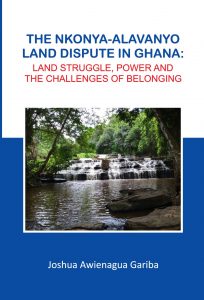 The Nkonya-Alavanyo Land Dispute in Ghana: Land Struggle, Power and the Challenges of Belonging focuses on the 100-year old land dispute between the two ethnic communities of Nkonya and Alavanyo in the Volta region of Ghana, who have engaged in intermarriages and other interactive social activities for over 300 years, until the land dispute emerged and weakened the social relations between them. The disputed land is fertile for agrarian activities, rich in timber and alleged to have deposits of gold, clay and mercury. While on the surface the conflict is known to be a boundary dispute, in the real world, the major issues driving the conflict are issues of court verdicts, ethnicity, land security, local and state politics, economic interest in commercial trees, autochthony and first comer narratives among other factors. It is however, the power and agency of traditional authorities, elite groups, and youth groups to instrumentalise and politicise these drivers that is largely responsible for the insolubility of the land dispute.
The Nkonya-Alavanyo Land Dispute in Ghana: Land Struggle, Power and the Challenges of Belonging focuses on the 100-year old land dispute between the two ethnic communities of Nkonya and Alavanyo in the Volta region of Ghana, who have engaged in intermarriages and other interactive social activities for over 300 years, until the land dispute emerged and weakened the social relations between them. The disputed land is fertile for agrarian activities, rich in timber and alleged to have deposits of gold, clay and mercury. While on the surface the conflict is known to be a boundary dispute, in the real world, the major issues driving the conflict are issues of court verdicts, ethnicity, land security, local and state politics, economic interest in commercial trees, autochthony and first comer narratives among other factors. It is however, the power and agency of traditional authorities, elite groups, and youth groups to instrumentalise and politicise these drivers that is largely responsible for the insolubility of the land dispute.
Over the years, colonial and post-colonial efforts such as maps, courts verdicts, and Mediation Committees have been employed to settle the land dispute, but all have been unsuccessful so far.
The book concludes that, given the failure of the above approaches to resolve the dispute, a broad-based process comprising of conflict resolution experts, the state and social scientists who should factor in the beliefs of the people about land, the role of chiefs, the elite, the youth, elders, women and other significant actors, offers a more sustaining trajectory for resolving the land dispute.
The book is a very good resource for students reading law, land economy, history, political science, sociology, anthropology and conflict and peace studies. Copies of the book are available at the bookshop of the Institute of African Studies (IAS), Legon, Accra.
Joshua Awienagua Gariba is an Anthropologist, and holds a PhD in Social and Cultural Anthropology from the Catholic University of Louvain, Belgium. His research is focused on land and community conflicts, youth agency, local authority structures, autochthony, media and religion. He is currently the Director of the Tamale Institute of Cross Cultural Studies (TICCS) which focuses on research and teaching. TICCS seeks to foster a deeper understanding of African culture for holistic human development in Africa and offers seminars, workshops and supervised “immersion” courses in cross-cultural activity to missionaries, development workers, NGOs, volunteers, interns etc.